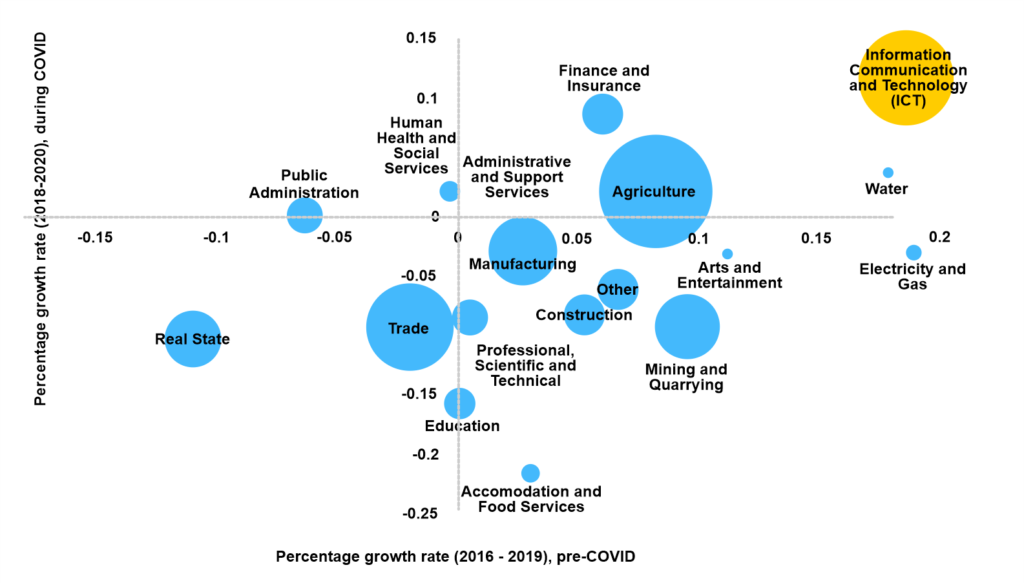THE NIGERIAN TECHNOLOGY INDUSTRY
The Nigerian Information, Communications, and Technology Sector is one of the fastest-growing in Nigeria. Between 2016 and 2019, it is reported (World Bank) that the Sector contributed 15 percent of the country’s gross domestic product (GDP), second only to agriculture, growing at 18 percent over the last five years.
Source: World Bank calculations using data from the Nigerian National Bureau of Statistics (NBS), cited in “Expanding Legal Migration Pathways from Nigeria to Europe: From Brain Drain to Brain Gain.”
The Sector stayed relatively active in 2020 as most of the nation’s industries embraced virtual work conditions. Data from the Nigerian Communications Commission (NCC) shows that telecommunications contributed as much as 12.45% to the GDP in the last quarter of 2020, up from 10.60% in the same quarter of the preceding year. This growth is attributable to increased demand, several years of policy implementation, and investment drive in the sector. (International Trade Administration).
While Sub-Saharan Africa is projected to be the fastest-growing region with a compound annual growth rate (CAGR) of 4.6% and an additional subscriber enrollment of over 167 million in the next five years, Nigeria is regarded as Africa’s largest ICT market with 82% of the continent’s telecoms subscribers and 29% of internet usage and is expected to account for over 55% of this. The NCC estimates that the country has about 76 million subscriptions on broadband (penetration of 40%) and 187 million lines in the voice segment as of May 2021, representing 97.9% teledensity. (International Trade Administration).
ICT is recognized by Nigerians as the enabler for developing other critical sectors including education, healthcare, agriculture as well as manufacturing and it is no surprise that a great number of the populace is exploring the ICT ecosystem. On the other hand, the Nigerian government in its drive to diversify the economy from oil and gas is encouraging partnerships between local ICT companies and foreign investors. Very recently in 2021, there has been a significant increase in incubator hubs, youth innovation programs, and science-technology parks across the country.
AFCFTA AND THE NIGERIAN INFORMATION, COMMUNICATIONS, AND TECHNOLOGY (ICT) SECTOR
The importance of technology in the 21st Century cannot be overstated. From a means of improving information dissemination to a vehicle for electronic commerce to a facilitator of payments, investment, and the creation of virtual employment markets, the digital economy is the new economy. However, none of the substantial gains available from this digital world are accessible without infrastructure. The equipment, cabling, and structures that are required to connect devices and relay communications are the very backbone of the ICT sector.
Technology adoption in Nigeria has advanced over the past years, driven rapidly by COVID-19. However, the lack of reliable ICT infrastructure in certain areas has the potential to strangle the progress of the new trade area. The importance of ICT infrastructure and the continental policy that can either advance or impede it is made plain when one considers the ‘digital divide’ facing Africa. The Alliance for Affordable Internet (AAI) publishes annual reports on the progress made in bridging the digital divide, and while all regions have made progress over the past five years, Africa remains the lowest-scoring on the Affordability Drivers Index (ADI).
During the third quarter of 2021, the National Information Technology Development Agency (NITDA), proposed a partnership with the Republic of Namibia in the areas of Innovations and Entrepreneurship through African Continental Free Trade Area (AfCFTA). The reasoning for this partnership cannot be overstated. It follows that Africa as a continent massively lost out during the First, Second, and Third Industrial Revolutions due to the huge capital investments. However, the Fourth Industrial Revolution presents endless opportunities and all that is needed is a talented and vibrant, young technologically driven generation.
It, therefore, follows that collaborations with NITDA in building a stronger relationship would be of immense importance to the development of technology not just between the two countries but the continent at large to explore and exploit opportunities provided by emerging technologies to build an enviable AfCFTA. It is salient to note that the AfCFTA framework concerning ICT is also driven towards the deliberate harmonization of policies and regulations about ICT infrastructure to enable cross-border operations of ICT service providers. One such effort toward improving the African technological ecosystem to drive the digital economy could be seen in the development of the Pan-African Payments and Settlement System (PAPSS) which is a centralized payment and settlement infrastructure for intra-African trade and commerce payments.
In a nutshell, a well-designed, transparent, consistent, and effective ICT infrastructure policy and regulation is a critical driver of the success of the digital economy. Not minding the headwinds associated with spectrum, access to broadband, cybersecurity, cross-border interconnection, and analog/digital broadcasting adoption, we opine that as ICT and digital infrastructure investment continue to grow, attention to the AfCFTA policy and framework is crucial to leverage the full gains in growing improved connectivity to benefit services and goods trade volumes.
